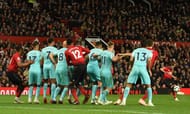#4 Keeper can hold the ball only for 6 seconds
FIFA laws state that a keeper can only keep hold of the ball for six seconds. So once they’ve collected it – via a shot, cross, or any other means of distribution – they have to release the ball in some way after six seconds to show that he is not holding it.
The keeper can merely bounce the ball after six seconds and doesn’t have to pass or get rid of it. All the keeper needs to do is to show that he/she has let the ball go from his/her grasp. This rule is not strictly enforced, but in case the keeper does hold the ball for a long time, and the referee notices it, then an indirect free kick would be awarded against the keeper's team.
#3 Attacker must not be near the defensive wall in free kicks

If a team gets a free-kick and the defending team has set up a wall of three or more players, then no player from the attacking team must be within one meter of the wall. This rule was introduced because when a player from the attacking team is a part of the wall or near it, then he/she can just move and create space, which can be used by the free-kick taker to score.
This defeats the purpose of the defensive wall, which is to offer some degree of protection in front of the goal. Moreover, the International Football Association Board (IFAB) which governs and develops the laws had this to say:
“Attackers standing very close to, or in, the defensive wall at a free-kick often cause management problems and waste time. There is no legitimate tactical justification for attackers to be in the wall and their presence often damages the image of the game.”
#2 In a penalty, the kicker cannot touch the ball until it is touched by another player
In a penalty in normal time, the penalty kick taker cannot touch/kick the ball to score after the kicked ball hits post and rebounds unless it is touched by another player. Either the ball must be touched by his teammate or the ball must be touched by the goalkeeper. Only then can the penalty kick taker attempt to score on the rebound.
#1 Direct free-kick into a team’s own goal will not be considered as a goal
This is a simple one. If a direct free-kick is kicked directly into a team’s own goal, a corner kick is awarded to the opposing team. But if the goalkeeper or any other player had touched the ball before going past the goal line, then a goal will be awarded.
